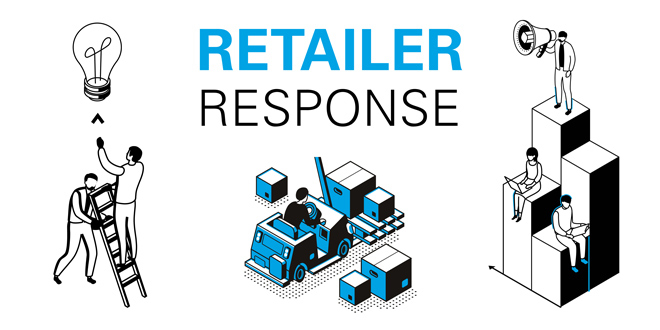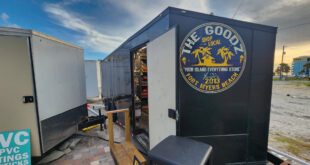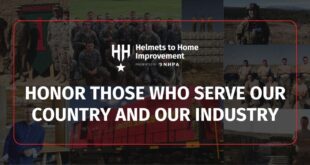When the spread of COVID-19 began changing the lives of residents in Winston-Salem, North Carolina, Cloverdale Ace Hardware was quick to find new ways to serve.
Store owner Douglas Brown scrambled to ensure his business could continue operating, while accommodating employees who were afraid to work.
He also worked hard to source products that were in high demand.
More customers than ever needed Brown’s store, but businesses throughout the U.S. were being forced to close as the virus spread.
“I had lost sleep, I can’t even tell you how many nights, not knowing what it would mean,” Brown says. “We weren’t even sure if we would be deemed an essential business.”
But the state government classified hardware stores as essential, and Brown has been working side-by-side with his employees every day, making changes to cleaning protocols to keep employees safe while adjusting services to help customers.
One of Brown’s latest initiatives
is a partnership with a local tech business to provide a new mobile app to customers. Brown uses the app to answer customer questions via text message or video chat.Customers can call Brown through the app and show him what’s broken on their toilet and ask for advice on how to fix the problem and what they need to buy.
“There’s a lot of expertise found in a store our size. This just gives us one more way of communicating and being responsive to our customer base,” he says.
Cloverdale Ace has also promoted curbside pickup, delivery to homes and deliveries to the guard gate at a gated retirement community. Sales have shot up because the store is meeting community needs in every way it can.
“I’m burning the candle at both ends to be sure we’re doing everything we can do,”Brown says. “I can’t tell you how often somebody looks me in the eye and says, ‘Thank you for being open. We appreciate you so much.’”
Gardening Kits for Kids
North Webster Ace Home Center in North Webster, Indiana, has done its part to help pay for community meals and provide products customers need during the pandemic.
Giving gifts to local children who were pulled out of school and learning to cope with social isolation was an additional way the store staff wanted to serve.
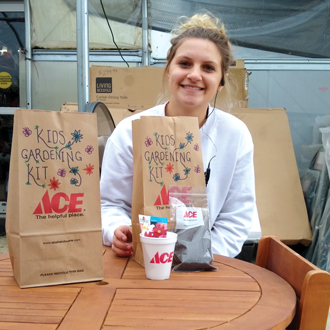 Employees put together planting kits in decorated paper bags containing seedlings and small amounts of compost and soil. They set the kits outside the store’s front door for parents to pick up for their kids while maintaining social distancing.
Employees put together planting kits in decorated paper bags containing seedlings and small amounts of compost and soil. They set the kits outside the store’s front door for parents to pick up for their kids while maintaining social distancing.
“It’s just something they can pull up and grab. People have liked it,” store owner Dennis Wagoner says. “It’s fun.”
The store advertised the free kits on social media and have made them available on an ongoing basis. Families have delighted in watching their plants grow and have posted pictures on Facebook to show the progress of the plants.
Offering Buckets of Goodness
South Fork Vodka, a family-owned distillery in Grass Valley, California, began making hand sanitizer for nearby hospitals and homeless shelters in April to meet desperate needs for sanitation supplies due to COVID-19.
The business needed 5-gallon buckets to deliver 250 gallons of the antiseptic. To help the cause, Hills Flat Lumber in Grass Valley donated 50 buckets.
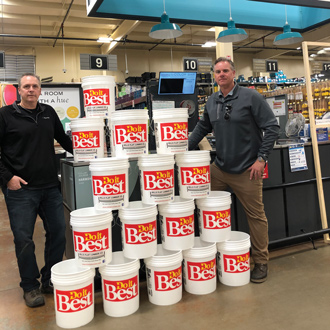 Jason Pardini, co-owner of Hills Flat, saw the partnership with another local business as a natural way to help health care and other professionals who serve vulnerable populations.
Jason Pardini, co-owner of Hills Flat, saw the partnership with another local business as a natural way to help health care and other professionals who serve vulnerable populations.
“We’re one of the largest employers in town and some people look to us for direction,” Pardini says. “We’ve been part of the fabric of the community for 99 years, so we’re always here to help when any need arises.”
Once the distillery was able to manage the bulk hand sanitizer needs, it began bottling smaller quantities for consumer use. Doing so helped Hills Flat Lumber, which had not been able to source high-demand hand sanitizer until it gained the local partnership and started stocking the sanitizer the distillery produced.
“It’s flying off the shelf,” Pardini says. “Availability is key in this day and age.”
Roof Camping for a Cause
As businesses in Spearfish, South Dakota, closed due to COVID-19, the need for food pantries in the community grew.
Local entrepreneur Rick Radliff helped start a temporary food pantry and approached Heisler’s Hardware about assisting with an unusual fundraiser to pay for food to stock it.
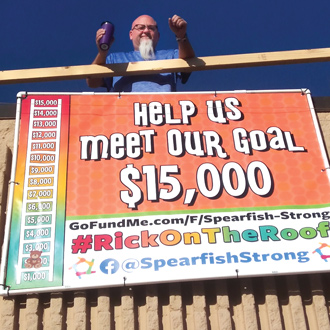 Radliff volunteered to camp on the highly visible store roof until the community raised $15,000 to sustain both the temporary and a permanent food pantry in town. Store co-owner Pam Heisler welcomed the idea.
Radliff volunteered to camp on the highly visible store roof until the community raised $15,000 to sustain both the temporary and a permanent food pantry in town. Store co-owner Pam Heisler welcomed the idea.
Heisler’s Hardware, which is located at one of the busiest intersections in Spearfish, used its scissor lift to get Radliff and his camping gear onto the store roof. Heisler’s also provided heaters to keep Radliff warm on nights when the temperature dipped as low as 28 degrees.
The community embraced the project. Radliff was prepared to stay on the roof around the clock for a week or longer, but donors together contributed more than $17,000 in four days via cash and a GoFundMe page. Some people dropped hundreds of dollars in cash in a bucket at the store and others gave smaller amounts that were equally sacrificial.
“It was so much fun and so humbling,” Heisler says.
Delivering Kindness
LC Ace Hardware is working hard not only to take care of customers through the COVID-19 pandemic but also to help other local businesses succeed.
The store is located in Lake Crystal, Minnesota, which has a population of about 2,000 people and only has a handful of local businesses to serve them.
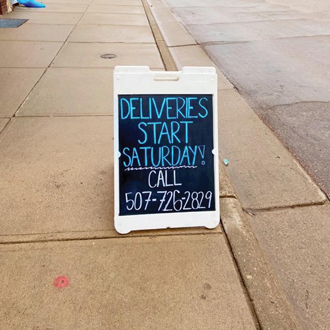 The hardware store and grocery store are both deemed essential businesses and are still open to the public, but other businesses have been closed or can offer pickup service only.
The hardware store and grocery store are both deemed essential businesses and are still open to the public, but other businesses have been closed or can offer pickup service only.
LC Ace co-owner Dan Buss thought of a way he could serve both customers and other businesses.
“We’re all friends in a small town,” he says. “I decided we were going to labor up and drive for them.”
Buss called on friends and employees to pitch in to help make weekend store deliveries to Lake Crystal residents’ homes—and pick up those residents’ grocery or restaurant orders on the way.
And if residents just ordered from Dairy Queen, then Buss was willing to send a delivery driver to pick up food and deliver it without a hardware store purchase.
“We want to see everyone succeed,” Buss says.
 Hardware Retailing The Industry's Source for Insights and Information
Hardware Retailing The Industry's Source for Insights and Information

